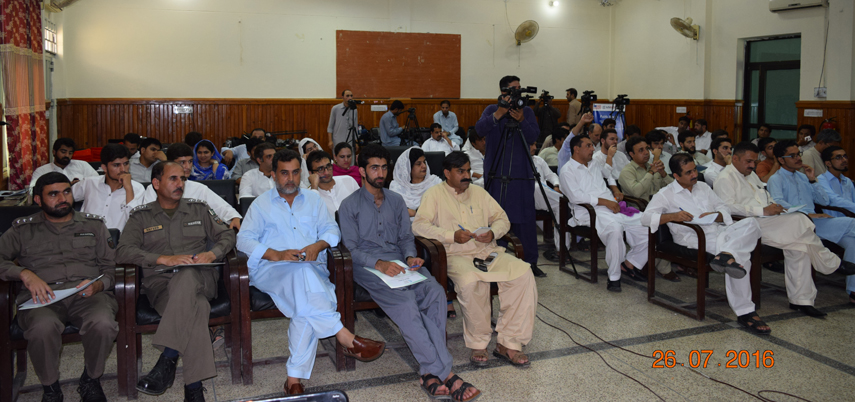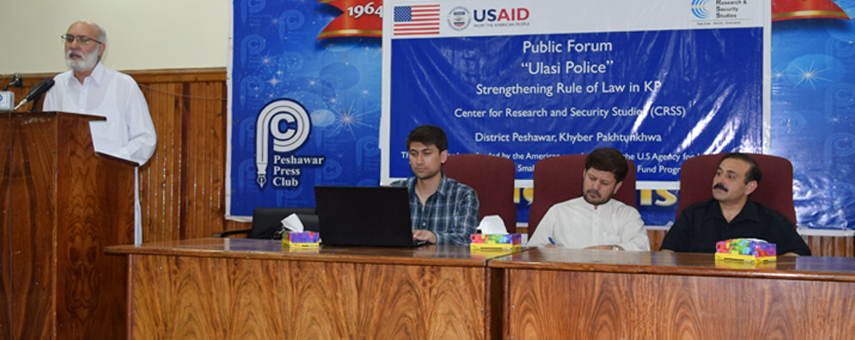Our vision for the KP Police – which drives majority of the police reforms – is an apolitical, operationally autonomous, accountable and people friendly department. We have a system of governance and laws but we need to pursue good governance and rule of law. The institutionalization of police reforms is critical. A legislation in this regard would be groundbreaking if the provincial government can bring a new police act. We have reached a consensus on proposed legislation; with police and all major stakeholders on board.
These were the remarks made by Mr. Inayat Ullah Khan, Senior Provincial Minister for Local Government and Rural Development, KP during a public forum on police reforms at press club, Peshawar. The other speakers included Mr. Muhammad Ijaz, Director General Projects, Coordination Unit, KP Police and Mr. Rahimullah Yousufzai, Senior Journalist. The event was participated well by the members of community with diverse backgrounds including lawyers, local government representatives, media, academia and youth representatives. The forum was part of the project “Ulasi Police” an awareness and advocacy campaign undertaken by the Center for Research and Security Studies (CRSS) – as part of USAID Small Grants and Ambassadors’ Fund Program – to strengthen the rule of law in KP province by promoting and disseminating the significant police reforms aimed at incorporating local communities’ policing needs and international human rights standards. The endeavor aims to tackle the trust deficit between the public and police, help KP police become an accountable and community-focused police force.
Mr. Inayat Ullah Khan said that rule of law was critical to ensure implementation of laws, accountability and good governance. We have inherited several institutions including Police from the colonial era and still there are impacts of colonial culture on police. But now the government is making reforms in Police department to improve its efficiency and capacity and make more accountable and people friendly. We have a system of governance and laws but we need to pursue good governance and rule of law.
“Reforming police is critical for upholding rule of law in the society. A consensus is also being developed among different stakeholders in this regard. The foremost aims of police reforms are to depoliticize the department and remove the political influence over it, award operational and administrative autonomy, and make it democratically accountable. To achieve these targets, the provincial government is bringing a new legislation through “Police Reforms Act”. We can also consider bringing an ordinance as part of our efforts to ensure the sustainability of reforms.” The senior minister also said the image of KP Police is better in comparison with other provinces.

Mr. Rahimullah Yousufzai described public-police relationship as Love-Hate relationship. “Police gets more criticism in rural areas than the urban areas”, he said while adding that the image of KP Police is better than other provinces. While all these initiatives of community policing and technological modern tools are of significant importance, it is critical to ensure the sustainability of these reforms and ensure same amount of budget for police in the future.
“Deputing IGP who belongs to another province helps preventing any conflict of interest and reducing the political influence over the police. This also helps harmonizing the society and foster capacity building within the police”. He said while adding that the public interest should always be paramount than the personal interest be it journalism, public service or any other profession. “While it is important to point out the shortcomings in the police, it is equally important to appreciate them and the tremendous sacrifices they have made going above and beyond the call of their duty”.
The third speaker for the forum, Mr. Muhammad Ijaz, Director General Projects, Coordination Unit, KP Police said that the KP Police reforms were aimed at professionalizing their services and conduct to improve the efficiency and public-relations; for a peaceful and crimes free society.
The lack of diverse database was one of the major issues facing the KP Police and remained a challenge since long. The issue has been addressed through several technological modern tools such as Police Access Service (PAS), Identity Verification System (IVS), Vehicle Verification System (VVS), Criminal Record Verification System (CRVS), Hotspot Policing (Geo Tagging), Online FIR and SOS Call Service.
“One of the prime consideration of police reforms was to reduce the fear of police among the public. Thus they aimed to reduce the gaps, establish public-police linkages and restore public trust in police. In this regard, Dispute Resolution Councils (DRCs), Police Assistance Lines (PALs), Model Police Stations and Public Liaison Councils are at the core of community policing to ensure rule of law in the society.”
The participants from the community underscored the need for wider propagation and dissemination of police reforms as the people at large are not well aware of the services aimed at benefiting them. Women are mostly scared of visiting the police stations and not aware of the services awaiting them. There is a strong need to have female police officers in the police stations to encourage the female victims of crimes to seek justice; visiting the police stations. As for the trust deficit, it enormously important to improve the behavior of police towards the public.
Institutionalizing Police Reforms is Critical, Senior Provincial Minister for LG&RD, KP

TOP STORIES
TESTIMONIALS
“For the past nine years, I have been living in Pakistan. Being part of different youth initiatives here has allowed me to witness the incredible warmth and hospitality of the Pakistani people, and how they empathize with young Afghans like me. The Pak-Afghan Youth Peace Initiative by CRSS has helped me realize my potential as a youth and refugee leader. I’m determined to spread the messages of peace and friendship that I am taking away from this fellowship.”
